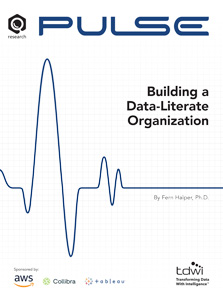
TDWI Pulse Report | Building a Data-Literate Organization
July 9, 2021
Today’s organizations want to modernize their data and analytics environments in order to become more data-driven and better compete. As part of the move to modernize, organizations realize they need to become more data literate.
Data literacy involves how well users understand and can interact with data and analytics and communicate the results to achieve business goals. It includes understanding the business, framing analytics, critically interpreting the results, and communicating these results to others.
Data literacy is not only for business analysts; this is a critical skill for individuals across a data-driven organization, although the level of literacy may vary by role. Many organizations want to modernize, but there is still work to be done in order for them to make the best use of their data and analytics.
This TDWI Pulse Report uses recently collected data from a global survey to examine how data and analytics professionals view data literacy and why it is important, the characteristics of data-literate companies, and best practices for becoming a data-literate organization.